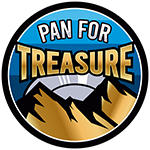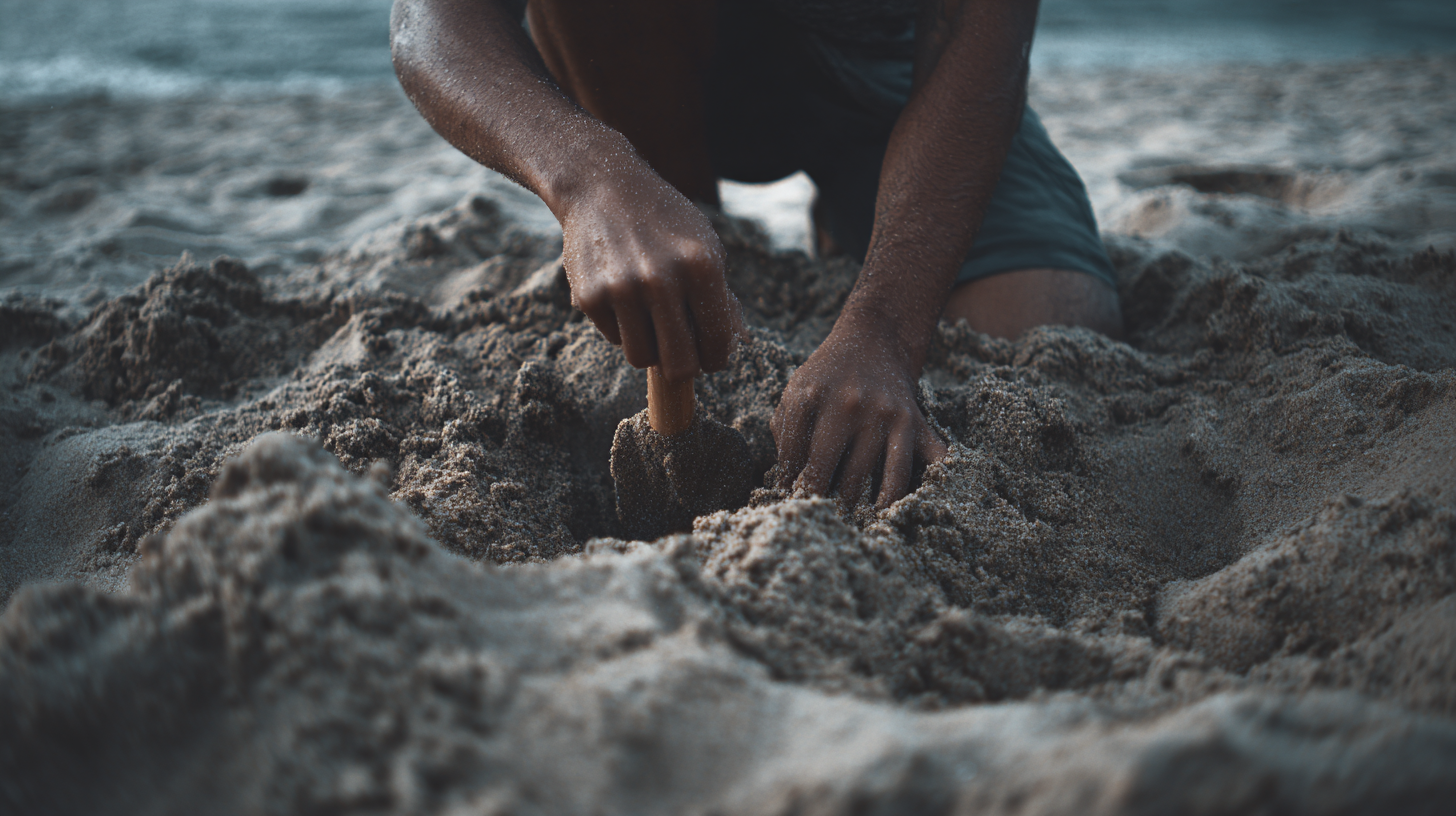The idea of gold prospecting is very appealing. Many dream of finding gold in the ocean. It’s known that there are about twenty million tons of gold in the ocean at any time.
First Posted July 15, 2025 | Last Updated on February 1, 2026 by Ryan ConlonDisclosure: This Post Contains Affiliate Links; We earn a commission on purchases.
Gold does exist in saltwater, but it’s hard to get because of all the water. This makes the gold-to-water ratio very small. Yet, many are interested in gold panning in saltwater and on beaches.
Key Takeaways
- Gold is present in the ocean, with an estimated twenty million tons.
- The gold-to-water ratio is extremely small, making extraction challenging.
- Gold prospecting on beaches is a possibility, but it requires careful planning.
- Saltwater gold panning is an intriguing prospect, but it’s not without its difficulties.
- Understanding the challenges is key before trying to pan for gold in saltwater or on beaches.
The Science Behind Gold in Coastal Areas
Gold in coastal areas comes from the Earth’s history. Over millions of years, gold from mountains gets eroded and moves to the ocean. This happens through natural processes.
How Gold Reaches the Ocean
Gold gets to the ocean mainly through erosion. Weathering and erosion of rocks and soils release gold. Then, rivers and streams carry it to the ocean.
Waves and currents spread it along coastlines.
Black Sand and Heavy Minerals
Black sand is linked to gold deposits. It’s made of heavy minerals like magnetite and garnet. These minerals are denser than quartz.
Prospecting for gold in coastal areas often involves identifying locations where these heavy minerals accumulate. This is because they often mean gold is nearby.
Geological Processes That Concentrate Beach Gold
Several processes make gold concentrate on beaches. Wave action and tidal currents sort and concentrate heavy minerals. Beach morphology and natural traps, like crevices, can also help gold concentrate.
Knowing these processes is key for finding gold on beaches. Spotting signs like black sand and heavy minerals helps. Also, understanding local geology and beach formations is important.
Can You Pan for Gold in Saltwater or on Beaches?
Beach gold prospecting is different from freshwater gold panning. Saltwater is corrosive and gold in coastal areas has special traits. You need equipment for beach gold panning and knowledge.
Differences Between Freshwater and Saltwater Gold Panning
Saltwater harms metal detectors and other gear more than freshwater. You need specialized equipment for saltwater. For more info, check this page on beach metal detecting.
Beach gold is finer and more worn. Waves and tides wear it down. You need finer mesh screens to catch it.
Types of Gold Found in Beach Environments
Beach gold is finer and more broken than river gold. Waves and sand wear it down. Knowing what gold looks like is key for saltwater gold prospecting techniques.
Realistic Expectations for Beach Gold Recovery
Finding gold on beaches is possible but not easy. Big finds are rare, and most are small. But, with the right gear and skills, you can have fun and maybe find some gold. Look for the best locations for saltwater gold panning to increase your chances.
Essential Equipment for Beach Gold Prospecting
Beach gold prospecting needs the right tools for saltwater. The marine environment is harsh. So, the gear must be tough and not corrode easily.
Basic Tools for Beach Prospecting
Starting with basic tools is key for beach gold prospecting. You’ll need a strong gold pan, a shovel or trowel, and a classifier or sieve. A gold pan is vital for separating gold from soil and gravel.
Beginners should start with simple gear. As you get better, you can add more tools. For example, a classifier makes panning easier by removing big stones and debris.
Specialized Equipment for Saltwater Environments
Saltwater is corrosive, so you need specialized equipment. Tools made of stainless steel or titanium are best. For serious hunters, a metal detector for beach hunting is great. It finds gold nuggets or jewelry hidden under the sand.
Protecting Your Equipment from Salt Corrosion
Keeping your gear safe from saltwater is important. Clean it with fresh water after each use. Use a protective coating or lubricant on metal parts to stop corrosion.
For metal detectors, a waterproof cover is helpful. This is true for wet or underwater hunting. The right equipment and care can boost your success in saltwater.
Effective Techniques for Saltwater Gold Panning
Successful saltwater gold panning needs good beach reading skills. It also requires timing your search with nature’s cycles. Plus, knowing how to process sand is key. These skills can make finding gold easier.
Reading Beach Formations and Identifying Promising Locations
Beach shapes help find gold. Look for black sand and heavy minerals to spot gold. Here’s where to search:
- Beach sections with coarse sand and gravel
- Areas behind large boulders or rock outcrops
- Zones where the beach narrows or changes direction
These spots gather heavier stuff, like gold, because of waves and currents.
Timing Your Beach Prospecting with Tides and Seasons
When you search matters a lot. Tides and seasons can uncover new spots or make gold areas more visible. For example:
- Low tide shows new beach areas that might have gold.
- After storms, beaches get new sand and gravel that could be gold-rich.
- Some seasons are better for finding gold because of wave patterns.
Processing Beach Sand Material
After finding good material, you need to process it right. This means:
- Using a gold pan or sluice box made for saltwater.
- Separating gold from other heavy minerals carefully.
- Cleaning your gear often to avoid salt damage.
Learning these steps can boost your saltwater gold panning success.
Top Beach Gold Panning Locations in the United States
The West Coast, from California to Oregon, is great for beach gold panning. It has lots of gold and good conditions for finding it.
West Coast Gold Beaches
The West Coast, mainly Northern California and Oregon, is famous for its gold beaches. The gold-bearing sands and gravels along these coasts are full of chances for prospectors.
Northern California and Oregon Hotspots
Some top spots for beach gold panning on the West Coast are:
- Beaches near Klamath River, California, known for their rich gold deposits
- Oregon Dunes National Recreation Area, where gold can be found in the sand and gravel
- Gold Beach, Oregon, a popular spot for gold prospecting
East Coast Opportunities
The East Coast, though less known, also has spots for beach gold panning. North Carolina and Georgia have gold streams and beaches to explore.
Some notable East Coast locations are:
- Beach areas near Capers Island, South Carolina
- Reed’s Creek and Beach areas in Georgia
Legal Considerations and Permits
Before you start beach gold panning, know the legal considerations and get any needed permits. Rules change by state and even within states.
- Ask local authorities about permits for gold panning in certain areas
- Learn about any environmental rules that might affect your prospecting
Conclusion
Gold prospecting on beaches and in saltwater is exciting. It mixes adventure with the chance to find gold. Metal detectors like the Whites TDI SL and Garrett ATX Pro for Gold work well in saltwater.
It’s key to know the differences between freshwater and saltwater when gold panning. Also, understand the types of gold found on beaches. By reading beach formations and timing your search, you can find more gold.
The United States has many places to try gold prospecting, from the West to the East Coast. Always check local rules and get the right permits before you start. For more tips, visit Kellycodetectors for a detailed guide.
FAQ
Is it possible to pan for gold in saltwater or on beaches?
Yes, you can pan for gold in saltwater or on beaches. But, you need special gear and skills. The ocean has lots of gold, but getting it out is hard.
How does gold reach the ocean and get concentrated on beaches?
Gold gets to the ocean through erosion and geological actions. On beaches, waves, tides, and currents help it gather. It often mixes with black sand and heavy minerals.
What is the difference between freshwater and saltwater gold panning?
Freshwater and saltwater gold panning use different tools and find different gold. Saltwater needs corrosion-resistant gear. The gold found is finer and more worn.
What equipment is needed for beach gold prospecting?
For beach prospecting, you need a gold pan, shovel, and classifier. For saltwater, use corrosion-resistant gear. Protective coatings can also help.
How can I identify promising locations for beach gold panning?
Look at beach formations and the role of black sand and heavy minerals. Time your prospecting with tides and seasons to find good spots.
What are the best locations for saltwater gold panning in the United States?
The West Coast, like Northern California and Oregon, is great for beach gold panning. The East Coast has some spots too, but the gold is smaller and less consistent.
Are there any legal considerations or permits required for beach gold panning?
Yes, there are legal rules and permits for beach gold panning. Know the laws in your area and get the right permits before you start.
What are the realistic expectations for gold recovery in beach gold panning?
Finding a lot of gold in beach panning is rare. It’s a tough but rewarding hobby. Enjoy the journey, not just the outcome.

Meet Ryan Conlon, the passionate owner and driving force behind Pan for Treasure.
With an unwavering love for the art of gold panning, Ryan has transformed his enthusiasm into a thriving community hub for fellow treasure seekers. [email protected]
A seasoned gold panning enthusiast, Ryan’s journey began with a simple pan and a dream, evolving into a deep appreciation for the history, geology, and thrill of uncovering precious metals.
Subscribe to Our Newsletter

